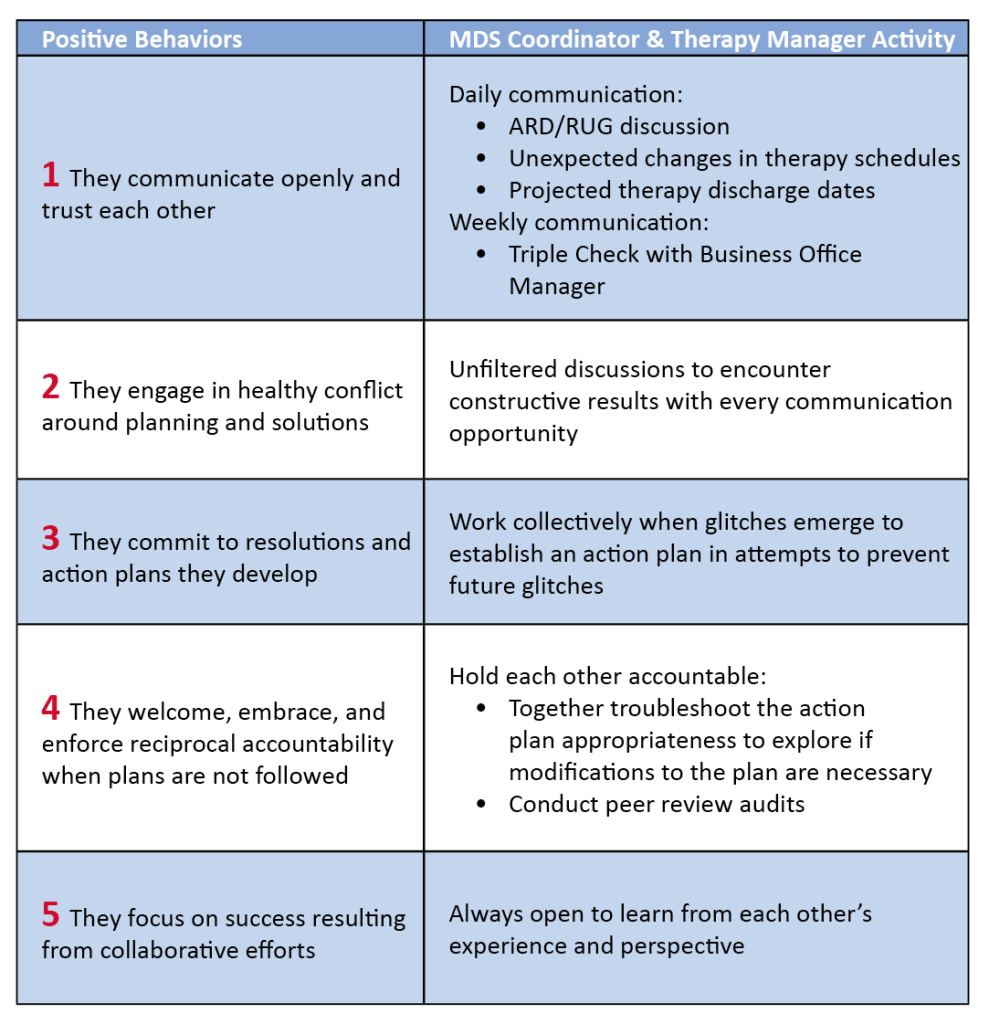John C. Maxwell said it best when he said, “Coming together is a beginning. Keeping together is progress. Working together is success.”₁
Relationships in healthcare are vital to the success of quality patient care. Without strong working relationships, systems will break down and the ones who ultimately suffer are the residents.
We must value and embrace loyal, mutual, long-lasting relationships with clients, residents and each other to achieve quality patient care through a cohesive team approach. Fostering an environment where solid relationships are expected will produce magnificent results!
One of the most essential relationships in the skilled nursing facility is the relationship between the MDS Coordinator and the On-site Therapy Manger.
“The MDS Coordinator is a valuable organizational resource whose input would improve organizational decision making.”₂ The MDS Coordinator’s role is “intrinsically integrative” with potential to impact quality of care. However, the potential of the MDS Coordinator to influence important care processes such as assessment, decision-making and care planning may be moderated by the quality of their relationship patterns across the organization. Maximizing that potential through attention to relationship patterns among staff can help to unlock the capacity of the MDS Coordinator to positively influence care processes and improve quality of care.” ₂
The Therapy Manager has the key role of effectively coordinating within the interdisciplinary team to manage and assure resident therapy needs are met while simultaneously functioning within the confinements of the MDS and PPS systems. In order to effectively coordinate care and manage the MDS and PPS systems, the Therapy Manager must create, preserve, and grow their relationship with the interdisciplinary team, but with an emphasis on the MDS Coordinator partnership.
THE FINALE
The scrutiny that health care providers are under leaves us little room for error and we are under extreme examination from government agencies. These examinations can be burdensome, stressful, and downright terrifying. Having sound relationships in the skilled nursing facility environment are crucial.
THE SIGNPOSTS
Healthcare providers understand that the key to success is dependent on the quality of the people caring for the residents. Quality healthcare providers possess a caring sense of compassion, a winning attitude, they continuously look for ways to improve, and they build-up and support their teammates to achieve success.
THE TAKEAWAY
Improving relationships in the skilled nursing facility are vital to the quality of resident care and outcomes. Ensuring your systems are strengthened, policies and procedures are followed, and constructive open communication is encouraged will improve your overall outcome. Have you seriously examined the relationships in your facility lately?
VALUE IN RELATIONSHIPS
These two critical roles work together to ensure regulations are adhered to and reimbursement is sustained. Five tips are listed in the following grid to increase awareness of the partnership between the MDS Coordinator and Therapy Manager.
₁Teamwork Makes The Dream Work, by John C. Maxwell; 2002 by Maxwell Motivation, Inc.; Published by J. Countryman®
₂ National Library of Medicine (NLM), MDS Coordinator Relationships and Nursing Home Care Processes
Mary L. Piven, PhD, RN, Post-Doctoral Fellow, Donald Bailey, PhD, RN, Assistant Professor of Nursing, […], and Ruth A. Anderson, PhD, RN, FAAN, Associate Professor of Nursing http://www.ncbi.nlm.nih.gov/pmc/articles/PMC1472871/
Click here to download/print this Executive Brief:





Comments (0)